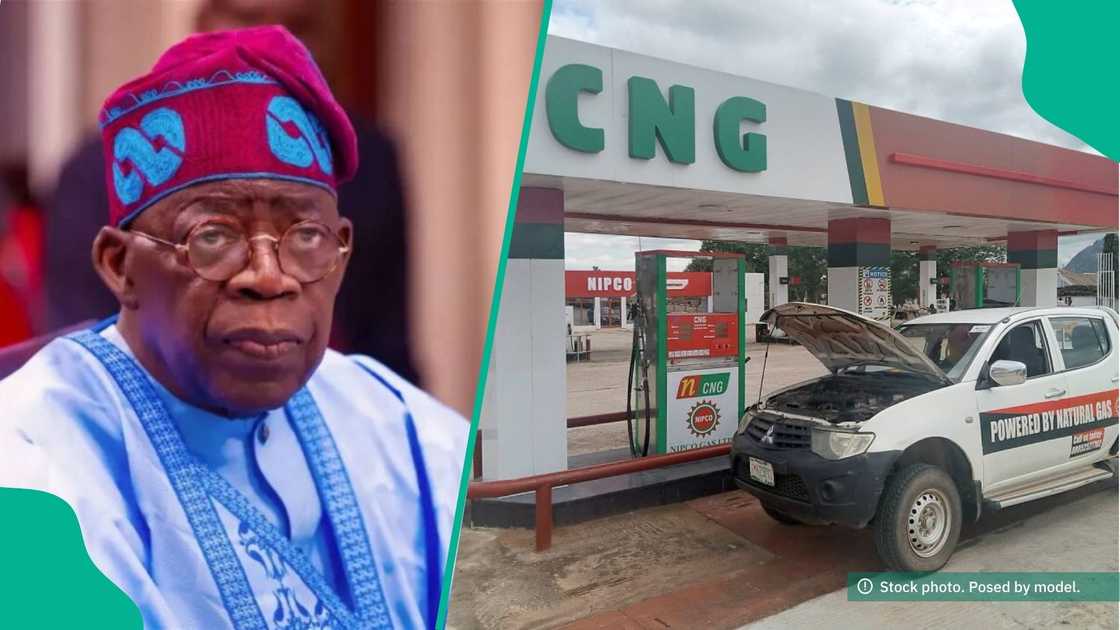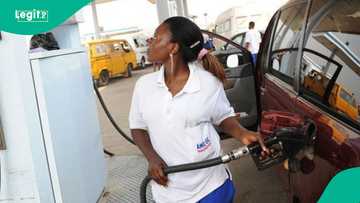NNPCL to Cut CNG Conversion Cost by 50% to Ease Fuel Burden on Nigerians
- The Nigerian National Petroleum Company Limited (NNPCL) announced plans to slash the cost of converting vehicles to CNG by half
- The new policy aims at encouraging a stronger CNG adoption and access as a cheaper alternative to petrol
- Lekan Ogunleye, vice president, Gas at NNPCL, disclosed the plan during an investigative hearing by the House of Representatives
Legit.ng’s Pascal Oparada has reported on tech, energy, stocks, investment and the economy for over a decade.
Millions of Nigerians could soon enjoy cheaper transport as the government moves to cut conversion costs for Compressed Natural Gas (CNG) vehicles by half.
The Nigerian National Petroleum Company Limited (NNPCL) has announced plans to reduce the cost of converting vehicles to Compressed Natural Gas (CNG) by 50%.
This bold move aims to encourage wider adoption of CNG as a cheaper, cleaner alternative to petrol and diesel fuels.

Source: Getty Images
Conversion centres are now in 24 states
The vice president, Gas at NNPCL, Lekan Ogunleye, disclosed the plan during an investigative hearing by the House of Representatives Ad-Hoc Committee on CNG Policy Implementation.
He said the company has already laid down essential infrastructure and appointed a focal point to drive private sector participation in the CNG rollout.
“We are supporting investor-led expansion while actively working to reduce conversion costs for consumers,” Ogunleye noted.
FG emphasises economic and climate benefits
According to Michael Oluwagbemi, project director of the Presidential CNG Initiative (Pi-CNG), Nigeria has expanded its conversion centres from just seven in 2023 to over 300 in 24 states.
More centres are expected to be operational by the first quarter of 2026.
Some vehicle owners, especially in public transport sectors, have already benefited from free conversions, thanks to public-private partnerships.
Oluwagbemi also highlighted the initiative’s strong stance on accountability, noting the recent dismissal of two staff members over ethical breaches.
Lawmakers demand transparency and inclusion
“We’re training more technicians in preparation for Phase Two. We’re scaling access while enforcing integrity,” he said.
Representing the Minister of State for Petroleum (Gas), Ekperikpe Ekpo, Permanent Secretary Vitalis Ibe said that CNG is central to Nigeria’s climate and economic resilience strategy.
“CNG is safer, cleaner, and more cost-effective. It helps reduce emissions and gives Nigerians cheaper transport options,” Ibe explained.
According to a report by Petroleumpriceng, the Speaker of the House, Hon. Tajudeen Abbas, represented by Hon. Sada Soli, called the initiative a key pillar of Nigeria’s energy transition. He urged fair distribution across all states to avoid marginalisation.
Drivers, workers push for full rollout
However, Ad-Hoc Committee Chair, Hon. Jaha Ahmadu Usman, raised concerns over limited access, unclear safety protocols, and poor public awareness more than a year after the Pi-CNG was launched.
He outlined four investigative pillars: safety and regulation, nationwide equity, global best practices, and long-term sustainability.
Transport worker unions, including the National Union of Road Transport Workers (NURTW), welcomed the cost-cut plan but urged the government to ensure inclusion across all 36 states.
“This will only work if everyone, especially low-income drivers, can access it,” said one representative.
While the planned 50% cost slash may offer hope to many, experts agree that sustained funding, transparency, and a nationwide rollout are critical for lasting success.

Source: UGC
FG Set to bring affordable fuel to Nigerians
Legit.ng earlier reported that the federal government, through the Presidential Compressed Natural Gas Initiative (PCNGI), announced plans to complete about 175 new Compressed Natural Gas (CNG) stations within the next 12 to 18 months.
Michael Oluwagbemi, the PCNGI Programme Coordinator, made this known in a video shared on the PCNGI’s X account on Sunday.
Oluwagbemi explained that the goal is to make CNG more available and reduce the difficulty Nigerians face when trying to refuel.
Proofreading by Funmilayo Aremu, copy editor at Legit.ng.
Source: Legit.ng





